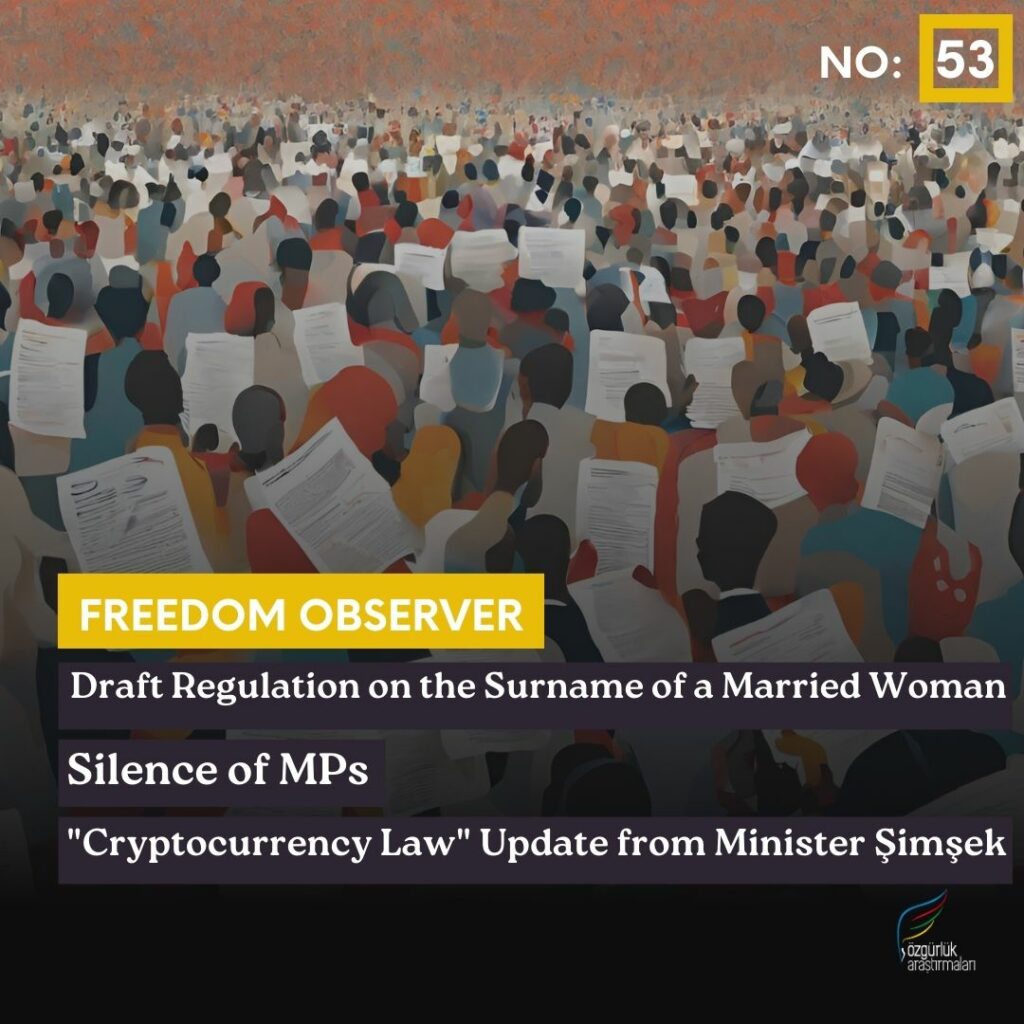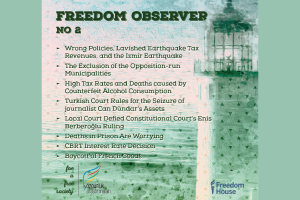
From Editor-in-Chief
With the start of the new year, political developments in Turkey have taken an unusual pace. However, the reason behind this acceleration is different from, as one might initially assume, the upcoming local elections. The fundamental factor responsible for the increased speed and intensity of the current agenda is the unfolding constitutional crisis resulting from the failure to release Ş. Can Atalay was elected as a Member of Parliament last May despite the Constitutional Court’s ruling. This situation has turned into a complex and protracted issue.
As we previously summarized in the last issue of Freedom Observer, the Constitutional Court’s ruling, which declared that Can Atalay’s right to be elected as a Member of Parliament and his right to liberty and security were violated when he was not released, has not been upheld by the relevant courts. Furthermore, the Court of Cassation has initiated criminal proceedings against the members of the Constitutional Court who supported this ruling. MP Atalay subsequently filed a new application with the Constitutional Court, and once again, the Constitutional Court issued a similar verdict. However, the same courts continue to disregard the Constitution. In the meantime, the Court of Cassation has sent its decision against Atalay back to the Turkish Grand National Assembly, requiring that he be disqualified as a member of Parliament by the verdict.
Meanwhile, in the absence of any action taken by the Speaker of the Parliament to uphold the rights of the concerned MP, opposition parties submitted a written request for an extraordinary parliamentary session. This request was made while Parliament was in recess, with the aim of initiating “a comprehensive debate to determine the stance and conduct of the Parliament regarding this issue, to investigate the underlying causes of the transition from a judicial crisis to a state crisis, and to make necessary adjustments to prevent such unlawful actions.” Regrettably, the AKP Speaker of the Parliament did not process this application either. Consequently, Atalay’s status as a Member of Parliament remains to be determined, as he has yet to be released despite two consecutive Constitutional Court rulings affirming the violation of his rights.
Meanwhile, there are some who believe that the AKP has proposed a solution that could enable Can Atalay to take his seat in Parliament. According to this proposed solution, a parliamentary decision would revoke Atalay’s parliamentary deputy status. Subsequently, Atalay would apply to the Constitutional Court to nullify this decision. Once the Constitutional Court overturned the decision to revoke his parliamentary status, Atalay would then be able to take his oath of office in Parliament.
However, there are concerns regarding the reasonableness of this proposal, as it takes a circuitous route and unnecessarily prolongs the process. Firstly, this formula is based on a premise that assumes, in advance, that the Court of Cassation’s decision should take precedence over the Constitutional Court’s decision in the case of Can Atalay, implying that the Court of Cassation holds ultimate authority in this matter. This formula replaces a clear constitutional violation with a subversion of the Constitution. As a result, in what is termed a “legal” dispute between the Constitutional Court and the Court of Cassation, indirect support is provided to the Court of Cassation, and there is an attempt to establish this unconstitutional solution as a customary practice.
Furthermore, even if this path is pursued, there is no guarantee that Atalay will not develop new “strategies” to prevent his return to Parliament. Additionally, there is uncertainty regarding whether there might be ulterior motives behind this proposal to prolong the issue until the current balance within the Constitutional Court shifts entirely in favor of the Government.
However, the course of action within the framework of the current Constitution is quite clear: Can Atalay should be released by the Constitutional Court’s ruling, and subsequently, he should take his oath of office in Parliament, commencing his constitutional duty of “representing the nation.
Furthermore, even if this path is pursued, there is no guarantee that Atalay will not devise new “strategies” to prevent his return to Parliament. Additionally, it remains uncertain whether there may be a deliberate agenda behind this proposal to protract the issue until the current balance in the Constitutional Court entirely favors the Government.
However, the course of action within the framework of the current Constitution is abundantly clear: Can Atalay should be released by the Constitutional Court’s ruling, following which he should take his oath of office in Parliament, and embark on his constitutional duty of “representing the nation.
A brief overview of other notable items on the agenda: The Constitutional Court has invalidated Article 9 of Law No. 5651, often called the “censorship law,” citing violations of freedom of expression and the press due to its allowance of “indefinite” internet content blocking. However, the Constitutional Court has deferred the implementation of this annulment decision for nine months. The reasoning behind the Constitutional Court’s decision to delay the immediate nullification of this provision, which continues to curtail rights as long as it remains in effect, remains unclear.
Meanwhile, an intriguing statement made by Ali Babacan, the leader of the DEVA Party, concerning the more than 70 “tax record holders” who have refused to disclose their identities has garnered attention in the media. Babacan suggested that their reluctance to reveal their names might be rooted in the fear of the Government seizing their assets. Babacan characterizes the AKP mentality behind this pervasive apprehension in the business world as follows: ‘My friend, we are in power. You’ve amassed this wealth, thanks to me. Could you have earned this money without me being in power for 20 years and creating opportunities for you? So, I have a claim to it. You will have to give me a portion.’ These pressures and demands are internalized and justified within their circles, illustrating the predatory and confiscatory mindset of the current Government. This revelation sadly portrays a stark reality of the AKP’s vision for the “New Turkey”!
As the local elections scheduled for March 31 approaches, parties have concluded their candidate announcements. Most notably, the AKP has nominated former Environment Minister Murat Kurum as its candidate for the Istanbul Metropolitan Municipality. A recent opinion poll showed that the incumbent Mayor, İmamoğlu, is only 6 points ahead of AKP’s Kurum. Given that the AKP candidate quickly closed the gap with İmamoğlu on the very first day, this margin between the two leading candidates is expected to narrow significantly over time.
Unless the CHP takes proactive steps to secure the support of some other opposition parties, it may risk losing Istanbul. This development raises doubts about whether the new leadership of the CHP and the IYI Party will continue to align with the opposition coalition formed before the general elections under pressure from the Kemalist base.”
While all this is happening, unfortunately, our soldier children continue to die in Northern Iraq! As a result of questionable political choices and administrative-technical mistakes.
In this issue, A. Rıza Çoban Evil evaluates that the draft regulation on women’s surnames on the agenda aims to maintain the current situation in contradiction with the equality between women and men, Ö. Faruk Şen draws attention to the generally passive profile of the deputies in the Turkish Grand National Assembly, which is related to the weakening of the legislative body and the leader-dominated party structure in the new system, and Çağın Eroğlu, on the occasion of the issue of updating the cryptocurrency law, reviews various problems related to cryptocurrencies, one of the alternative investment instruments caused by the deepening economic crisis.
See you in the next Freedom Observer.
* Mustafa Erdoğan
Draft Regulation on the Surname of a Married Woman
The surname of a married woman is regulated by Article 187 of the Civil Code. The current regulation states: ‘Upon marriage, a woman takes her husband’s surname; however, she may also use her previous surname before her husband’s surname upon a written application to the marriage officer or later to the civil registry office. A woman who previously used two surnames may exercise this right for only one surname.’ 1
As evident, this provision does not permit a married woman to use her surname independently, thus conflicting with the principle of equality. Consequently, this provision has been invalidated by the Constitutional Court and will no longer be in effect once the annulment decision becomes effective on January 28, 2024.
As a result, the Government is considering an amendment to Article 187 of the Civil Code in the 8th Judicial Package. This article, however, bears a striking resemblance to the previously annulled provision. In essence, it appears that the Government intends to disregard the Constitutional Court’s decision to annul the original provision and reintroduce essentially the same invalidated provision.
In the Government’s proposed draft, the new Article 187 reads as follows: ‘Article 187 – Upon marriage, a woman shall assume her husband’s surname. Nevertheless, a woman may also retain her former surname, placing it in front of her husband’s surname, by submitting a written application to the marriage officer or subsequently to the civil registry office. If a woman’s surname comprises her maiden name and her former husband’s surname, she may select only one of these surnames to place before her future husband’s surname.’
As evident, the proposed new text mirrors the content of the previously annulled provision. It is undeniably clear that this proposal contradicts international human rights agreements to which Turkey is a signatory, particularly the European Convention on Human Rights, and the country’s own Constitution. As early as 2004, the European Court of Human Rights ruled in the case of Ünal Tekeli2 v. Turkey that the restriction preventing married women from using their surname in isolation constituted discrimination and violated Article 14 of the Convention when considered alongside Article 8. Subsequently, the Strasbourg Court continued to issue similar judgments.
While the Turkish Constitutional Court did not explicitly declare Article 187 of the Civil Code unconstitutional, it did determine that this provision is at odds with the requirements of international conventions emphasizing equal surname rights for men and women following marriage.3 By the fifth paragraph of Article 90 of the Constitution, which prioritizes international conventions over domestic laws, Article 187 of the Civil Code, being inconsistent with these international conventions, cannot serve as a legal basis for decisions made by local courts. Article 187 of the Civil Code, conflicting with international conventions, cannot be invoked by local courts as a legal foundation for their judgments.4 In the aforementioned 2023 decision, the Constitutional Court ultimately ruled that the differential treatment between men and women concerning using surnames before and after marriage violated the principle of equality. This was because the differentiation lacked an objective and reasonable basis, leading to the annulment of this provision, which was found to contradict Article 10 of the Constitution.5
However, in the 8th Judicial Reform package proposed by the Government, married women are not granted the right to use their former surname independently. The rationale for this regulation underscores the significance of the family unit and argues that allowing both the mother and father to have distinct surnames could potentially have adverse consequences for the child. It is contended that determining which surname the child should adopt may lead to additional debates and might compromise the family’s cohesion, which serves as the cornerstone of Turkish society. Consequently, it has been asserted that the provision previously invalidated by the Constitutional Court will be revised. Under the revised law, married women will still assume their husband’s surname, but they will have the option to use their prior surname in conjunction with their husband’s surname if they so choose. If this provision is approved, it would violate both Article 153 of the Constitution, as it would not align with the binding annulment decision rendered by the Constitutional Court, and the international commitments stemming from human rights conventions to which the state is a signatory. The growing trend of state institutions failing to adhere to national and international judicial rulings, which has been observed for some time, would acquire a new dimension if this law were to be passed by the Parliament. Should the Parliament join the ranks of state bodies refusing to abide by the Constitution, it would not be an overstatement to assert that the state, inherently expected to be a legal entity, has forfeited this defining characteristic.
* Ali Rıza Çoban – Constitutional Lawyer
Silence of MPs
In 2018, with the transition to the presidential system, the role of the Parliament began to diminish significantly. This system, designed to shield the executive branch from parliamentary oversight, has weakened the connection between Members of Parliament (MPs) and the executive branch, limiting their scope of activity within the Parliament. According to reports from Evrensel Newspaper, in the past seven months, 58 deputies, out of 600 in Parliament, have not spoken in either the General Assembly or any parliamentary committee.6 In other words, nearly 10 percent of the MPs elected seven months ago have not actively participated in discussions or debates, apart from taking the initial oath. As expected, most of these 46 silent MPs belong to the AK Party.
What makes this silence particularly noteworthy is that it includes former ministers such as Süleyman Soylu, Murat Kurum, and Mevlüt Çavuşoğlu, who were elected as MPs from major metropolitan areas, either to prevent President Erdoğan from securing a victory in those regions or to ‘relegate’ them to the Parliament.
In democratic systems, one of the primary responsibilities of Members of Parliament (MPs) is to represent the concerns and issues of their constituents. They are expected to engage in debates, pose questions, and oversee the activities of the executive branch. However, in Turkey, MPs often appear more focused on their relationship with the party leader and less responsive to the needs and concerns of the voters who elected them. While the shift to a presidential system has played a significant role in silencing MPs and diminishing the role of the Grand National Assembly of Turkey (TBMM) in recent years, it is essential to acknowledge that a fundamental issue lies in the Law on Political Parties, which has transformed MPs from “elected” representatives into essentially “appointed” ones. When we examine the list of ruling and opposition MPs who have refrained from participating in debates in the General Assembly or committees, we can observe that they were typically elected as representatives from various “quota” categories designated by party leaders, such as based on kinship, tribal affiliations, or political alliances. Often, these MPs hail from major cities. Among these individuals, we find names like Bülent Arınç’s son, Ahmet Mücahit Arınç, Sadullah Ergin, who was elected from CHP lists, AKP MP Galip Ensarioğlu, and IYI Party MP Salim Ensarioğlu. MPs occupying seats they may not be effectively serving due to political agreements among elites, rather than being elected by their constituents, are a product of the current institutional framework. To address this issue and revitalize Turkish democracy, it is imperative to amend relevant legislation, particularly the Law on Political Parties.
It’s crucial to emphasize that the institutional change we propose for this purpose does not imply the adoption of the narrow district majority system that the AKP publicly discussed a few years ago. While the narrow district majority system may enhance the connection between voters and MPs, it should be recognized that it could potentially undermine the principle of fairness (proportionality) in representation both nationally and locally.
What is needed is the introduction of primary elections as a “binding mechanism” within our political party system to curtail the leader’s dominance within parties. Otherwise, we will continue to be ‘represented’ by individuals who merely raise and lower their hands and pursue careers within the corridors of Ankara rather than effectively representing the concerns and demands of the citizens!”
* Ömer Faruk Şen – Ph.D. – Missouri University
“Cryptocurrency Law” Update from Minister Şimşek
As the economic crisis deepens in Turkey, citizens are increasingly seeking alternative investment opportunities. The primary driver behind this search for alternatives is the stark disparity between the official inflation data and the daily consumption and spending experiences of the citizens. It’s important to note that inflation is an undeniable reality in Turkey. However, the disparities between the officially reported inflation figures and those perceived or calculated through alternative means have created a pervasive sense of uncertainty among the population. For instance, while TurkStat announced an official inflation rate of 64% for 2023, ENAG calculates the annual inflation rate at 124%. This significant divergence between the official figure and the perceived inflation underscores the substantial rate of return required by citizens to merely sustain their existing financial stability.
The surge in investment activity in Turkey is not a recent development. However, the combination of exceptionally high inflation rates and soaring exchange rates has transformed investment from merely an option for citizens into a necessity. This transformation is evident in the statistics, as the number of stock market investors grew from 1,240,903 in March 2020 to surpass 8 million people by September 2023.
However, despite a significant increase in stock market participation, it has been accompanied by pronounced fluctuations. For instance, while 1.5 million individuals entered the stock market as investors in September 2023, nearly 900 thousand people withdrew from the stock market in the subsequent two months. These abrupt shifts reflect the economic uncertainty prevailing in Turkey and highlight the agility with which citizens are actively exploring investment options.
Cryptocurrencies have emerged as one of the most sought-after alternative investment avenues among the general public. Remarkably, Turkey stands out as one of the countries with the highest levels of cryptocurrency investment in the world. This distinction holds not only in comparison to other nations but also in the proportion of the population involved. As of May 2023, a staggering 52% of the population between 18 and 60 in Turkey had invested in crypto assets. Notably, the overwhelming majority of these investments are intended for the long term. Consequently, cryptocurrency markets are not merely a short-term fintech trend for the Turkish populace but rather a long-term investment domain.
One of the most significant driving factors behind this trend is, of course, the prevailing economic uncertainty in Turkey. However, it is essential to acknowledge that not all cryptocurrencies are inherently secure for long-term investment. The trustworthiness of cryptocurrency exchanges frequently raises valid concerns. Nevertheless, the shift observed among investors in Turkey, as they transition from trusted platforms to less reputable alternatives, is a reality that merits scrutiny of economic policymakers rather than the investors themselves.
Regarding economic decision-makers, it is unsurprising that the government bureaucracy has not remained idle in response to the surging interest in cryptocurrencies. Recently, Minister of Treasury and Finance Mehmet Şimşek shared his insights regarding the forthcoming cryptocurrency legislation. Şimşek emphasized that the draft law includes a fundamental definition of cryptocurrency assets. He further highlighted that a vital aim of the draft legislation is to establish a regulatory framework for transactions conducted on cryptocurrency trading platforms.
Admittedly, discussions about cryptocurrency regulations occur in many developed countries today. Due to their decentralized and untraceable nature, cryptocurrency markets can be associated with concerns such as money laundering, fraud, and other illicit activities. This situation poses a significant threat to national security and the stability of traditional centralized economies. However, it is essential to recognize that not every cryptocurrency investor is driven by criminal intentions.
Therefore, nations should prioritize addressing the issues that directly impact the daily economic activities of their citizens. In the case of Turkey, the most crucial step in this regard would be to combat inflation effectively. It would be more suitable to regulate decentralized investment opportunities like cryptocurrencies.
There is no denying the significance of regulating and securing cryptocurrency markets to ensure a nation’s economic stability and its citizens’ safety. However, solely targeting cryptocurrencies is an example of the scarecrow fallacy. Minister Şimşek has underscored that one of the objectives of cryptocurrency regulation is to move out of the ‘partially compliant’ category with the Financial Action Task Force (FATF). In addressing financial crimes, it’s crucial to acknowledge that cryptocurrencies serve as a means rather than an end. Effective public policies should prioritize addressing the root causes before targeting the means used.
* Çağın T. Eroğlu
1Anayasa Mahkemesinin 22/2/2023 tarihli ve E. 2022/155, K. 2023/38 sayılı kararıyla, Türk Medeni Kanunu’nun 187. maddesi iptal edilmiş ve iptal kararının 28/4/2023 tarihli ve 32174 sayılı Resmî Gazetede yayımlanmasından başlayarak dokuz ay sonra (28/1/2024) yürürlüğe girmesine karar verilmiştir.
2 Ünal Tekeli/Türkiye, B. No:29865/96, 16/11/2004.
3 AYM, E.2009/85, K.2011/49, 21/10/2011.
4 Sevim Akat Eşki, B. No: 2013/2187, 19/12/2013; Gülsüm Genç, B. No: 2013/4439, 6/3/2014; Neşe Aslanbay Akbıyık, B. No: 2014/5836, 16/4/2015.
5 AYM, E.2022/155, K.2023/38, 22/02/2023.
6https://www.evrensel.net/haber/507111/secimden-beri-58-milletvekili-hic-konusmadi-tek-adam-konusmayan-vekiller?utm_source=aposto





